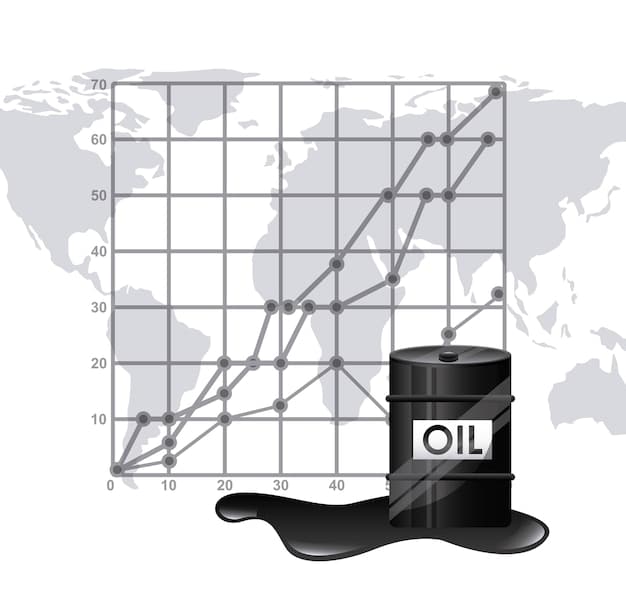Decoding Russia Sanctions: A 3-Month US Energy Market Outlook

Decoding the Impact of New Sanctions on Russia: A 3-Month Outlook for US Energy Markets explores how recent sanctions on Russia are poised to reshape the US energy landscape, impacting prices, supply chains, and geopolitical strategies over the next quarter.
The energy sector is bracing for impact as new sanctions against Russia intensify. Decoding the Impact of New Sanctions on Russia: A 3-Month Outlook for US Energy Markets reveals the expected shifts and potential volatility on the horizon.
Sanctions and the Shifting Energy Landscape
Recent sanctions imposed on Russia have sent ripples through the global energy market. Understanding how these actions will specifically affect the US energy sector over the next three months is crucial for businesses, consumers, and policymakers alike.
The US energy market, while largely independent, is still intertwined with global dynamics. A decrease in Russian energy exports due to sanctions can lead to price increases and supply chain disruptions, even within the US.

Initial Market Reactions
The immediate aftermath of the sanctions saw a notable increase in crude oil prices. This is a direct result of concerns about reduced supply and uncertainty in the market. However, the long-term effects are more complex and depend on several factors.
US energy companies are closely monitoring these developments, adjusting their production and distribution strategies to navigate the changing environment. Government agencies are also involved, exploring measures to mitigate potential negative impacts on consumers.
Potential Supply Chain Disruptions
- Reduced Russian exports could lead to shortages of certain petroleum products.
- US refineries might face challenges in sourcing necessary feedstocks.
- The transportation of energy resources could become more complex and expensive.
The initial market reactions to the sanctions are just the tip of the iceberg. The coming months will reveal the true extent of their influence on the US energy market, requiring careful analysis and strategic adaptation.
The Impact on US Oil Production
US oil production is poised to play a critical role in offsetting the potential shortfall caused by sanctions on Russia. Increased domestic output could help stabilize prices and ensure a consistent supply of energy to meet demand.
However, boosting production is not without its challenges. The US oil industry must balance the need for increased output with environmental concerns and the long-term sustainability of energy resources.
Strategies for Increasing Production
Several strategies can be employed to increase US oil production in the short term. These include optimizing existing wells, deploying new technologies, and streamlining the permitting process for new drilling projects.
Investment in renewable energy sources also plays a role, reducing the overall reliance on fossil fuels and contributing to long-term energy security. However, the immediate focus is on maximizing the production of available oil resources.
Challenges and Considerations
- Environmental regulations may limit the scope of production increases.
- The availability of skilled labor and equipment could pose constraints.
- Market volatility and uncertainty could deter investment in new projects.
Successfully navigating these challenges will require a collaborative effort between government, industry, and environmental stakeholders. A balanced approach that prioritizes both energy security and environmental sustainability is essential.
Ultimately, the impact of the sanctions on US oil production will depend on a number of factors, including the severity of the sanctions, the global demand for energy, and the ability of the US industry to adapt and innovate.
Refining Capacity and Bottlenecks
The US refining sector is a critical component of the energy supply chain, transforming crude oil into usable products like gasoline, diesel, and jet fuel. However, this sector faces its own set of challenges, including limited capacity and potential bottlenecks.
Sanctions on Russia could exacerbate these existing issues, leading to higher prices and potential shortages of refined products. Understanding the dynamics of the US refining sector is crucial for mitigating these risks.

Current Refining Capacity
The US currently has a significant refining capacity, but not all refineries are operating at full potential. Factors such as maintenance shutdowns, equipment failures, and regulatory compliance can limit overall output.
Furthermore, the type of crude oil that a refinery can process also plays a role. Some refineries are specifically designed to handle certain types of crude, and changes in the availability of these crudes can affect their operations.
Potential Bottlenecks
- Transportation limitations could hinder the movement of crude oil to refineries.
- Storage constraints might limit the ability to stockpile refined products.
- Labor shortages could disrupt refinery operations.
Addressing these potential bottlenecks will require proactive measures and strategic investments in infrastructure. Improving transportation networks, expanding storage capacity, and ensuring a skilled workforce are all critical steps.
By optimizing the refining sector, the US can better insulate itself from the negative impacts of sanctions and ensure a reliable supply of refined products for consumers and businesses.
Geopolitical Implications for the US
The sanctions against Russia have far-reaching geopolitical implications for the United States, extending beyond the immediate energy market. These actions affect US foreign policy, international alliances, and the country’s overall standing in the world.
Understanding these broader geopolitical dynamics is essential for assessing the long-term consequences of the sanctions and formulating effective strategies to protect US interests.
Strengthening Alliances
The sanctions have provided an opportunity for the US to strengthen its alliances with key partners around the world. By working together to enforce the sanctions, countries can demonstrate a united front against aggression and uphold international norms.
However, maintaining these alliances requires careful diplomacy and a willingness to address the concerns of all parties involved. The US must be prepared to provide support and assistance to countries that are negatively affected by the sanctions.
Impact on US Foreign Policy
The sanctions have significantly altered the landscape of US foreign policy. The US must now navigate a complex web of relationships, balancing the need to confront Russia with the desire to maintain stability in the global energy market.
This requires a strategic approach that combines economic pressure with diplomatic engagement. The US must also be prepared to respond to potential retaliatory actions from Russia.
The geopolitical implications of the sanctions extend beyond the immediate conflict. These actions have the potential to reshape the global order and redefine the role of the United States in the world.
Alternative Energy Sources and Long-Term Strategies
While the immediate focus is on mitigating the short-term impacts of sanctions, the long-term solution lies in diversifying energy sources and investing in renewable energy. By reducing reliance on fossil fuels, the US can enhance its energy security and reduce its vulnerability to geopolitical disruptions.
This requires a comprehensive strategy that encompasses technological innovation, policy changes, and market incentives. A concerted effort from government, industry, and consumers is essential for achieving long-term energy independence.
Investing in Renewables
Investing in renewable energy sources such as solar, wind, and hydropower is crucial for reducing reliance on fossil fuels. These sources provide a clean and sustainable alternative that can help mitigate climate change and enhance energy security.
However, the transition to renewable energy requires significant upfront investment and a willingness to overcome technological challenges. Government subsidies, tax incentives, and research grants can play a vital role in accelerating the adoption of renewable energy technologies.
Promoting Energy Efficiency
Promoting energy efficiency is another key component of a long-term energy strategy. By reducing energy consumption, the US can lower its overall demand and reduce its reliance on foreign sources of energy.
This can be achieved through a variety of measures, including improving building codes, promoting the use of energy-efficient appliances, and investing in public transportation.
Ultimately, the long-term solution to the challenges posed by sanctions lies in creating a more resilient and diversified energy system. By investing in renewable energy, promoting energy efficiency, and fostering technological innovation, the US can secure its energy future and enhance its geopolitical standing.
Economic Ramifications for US Consumers
The sanctions on Russia are expected to have a direct economic impact on US consumers, primarily through higher energy prices. The price of gasoline, heating oil, and other energy products is likely to increase, putting a strain on household budgets.
Understanding these economic ramifications is crucial for developing strategies to mitigate the negative impacts on consumers, particularly those with low incomes.
Increased Energy Costs
The most immediate impact of the sanctions will be an increase in energy costs. As the supply of Russian energy to the global market decreases, the price of crude oil and refined products will likely rise.
This increase in energy costs will be felt by consumers in a variety of ways, including higher prices at the pump, increased heating bills, and higher costs for goods and services that rely on energy for production and transportation.
Potential Mitigation Strategies
- Government subsidies and tax credits can help offset the increased cost of energy for low-income households.
- Promoting energy conservation can help consumers reduce their overall energy consumption and lower their bills.
- Investing in public transportation can provide consumers with a more affordable alternative to driving.
Successfully mitigating the economic impact of the sanctions on US consumers will require a coordinated effort from government, industry, and community organizations. By working together to address the challenges, the US can ensure that all consumers have access to affordable and reliable energy.
The economic ramifications for US consumers are a significant concern, but with careful planning and proactive measures, the negative impacts can be minimized.
| Key Point | Brief Description |
|---|---|
| 📈 Price Hikes | Sanctions drive up crude oil and gasoline prices in the US. |
| 🏭 Production Boost | US aims to increase oil production to offset supply shortages. |
| 🤝 Geopolitical Shifts | US strengthens alliances, navigates complex foreign policy. |
| ☀️ Renewable Focus | Long-term shift towards renewable energy for stability. |
Frequently Asked Questions
▼
Sanctions are likely to increase gasoline prices in the US due to reduced global oil supply, potentially affecting consumer budgets and driving inflation.
▼
The US can compensate by increasing domestic oil production, but this may face regulatory and environmental hurdles, limiting the full offset.
▼
Renewables become more crucial, offering long-term energy security and mitigating dependence on volatile fossil fuel markets affected by sanctions.
▼
Geopolitical alliances are tested and strengthened as nations coordinate sanctions, requiring diplomatic efforts to maintain unity against Russian aggression.
▼
The long-term strategy involves diversifying energy sources, investing in renewables, and promoting energy efficiency to enhance energy independence and resilience.
Conclusion
In conclusion, the new sanctions on Russia are set to significantly impact the US energy market over the next three months. Increased prices, potential supply chain disruptions, and shifting geopolitical alliances are just some of the challenges that lie ahead. However, by proactively addressing these challenges and investing in long-term solutions, the US can mitigate the negative impacts and secure its energy future.



